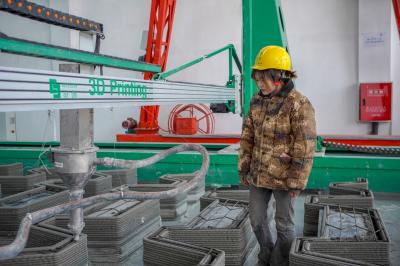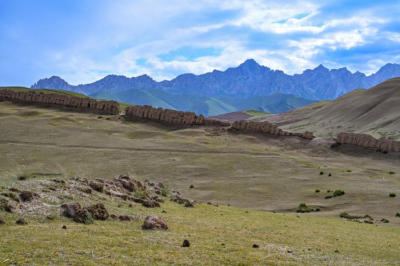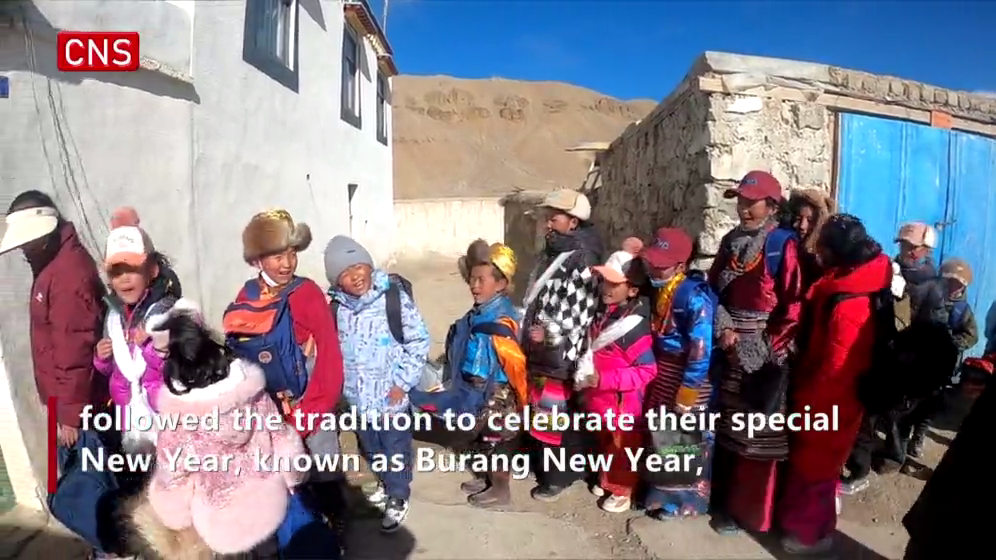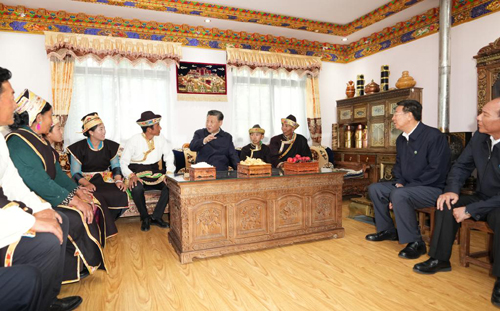 President Xi Jinping, also general secretary of the Communist Party of China (CPC) Central Committee and chairman of the Central Military Commission, chats with the Dawa Gyaltsen family in their living room at Galai village of Nyingchi, Southwest China's Tibet autonomous region, July 21, 2021. [Photo/Xinhua] President hails decades of progress in region, stresses stability, high-quality development
July 27, 2021 -- President Xi Jinping has laid out a new vision for ethnic unity, lasting peace and stability, and the high-quality development of the Tibet autonomous region, stressing the need to secure new achievements in ecological protection and sustainable growth in the plateau area.
The landmark visit made by Xi, which took him to the cities of Nyingchi and Lhasa, the regional capital, from Wednesday to Friday, is set to spur the people and officials in the region to make greater progress in various areas, analysts said.
Xi, who is also general secretary of the Communist Party of China Central Committee and chairman of the Central Military Commission, made the visit on the occasion of the 70th anniversary of Tibet's peaceful liberation. It was the first time a top Chinese leader has taken part in such a celebration in the history of the Party and the country.
"The visit fully demonstrated the strong concern from the CPC Central Committee and Xi for the different ethnic groups of Tibet. It was also a gesture of full reckoning of the phenomenal achievements of the region over the past seven decades," said Zhang Yun, director of the Institute of History Studies of the China Tibetology Research Center.
During the tour, Xi visited the Nyang River Bridge to inspect ecological conservation in the basin of the Yarlung Zangbo River and its tributary, the Nyang, before making a visit to a local urban planning hall, a village and a park in the city.
At Nyingchi Railway Station on Thursday, he learned about the overall planning of the Sichuan-Tibet Railway and the operation of its Lhasa-Nyingchi section, before taking a train to Lhasa.
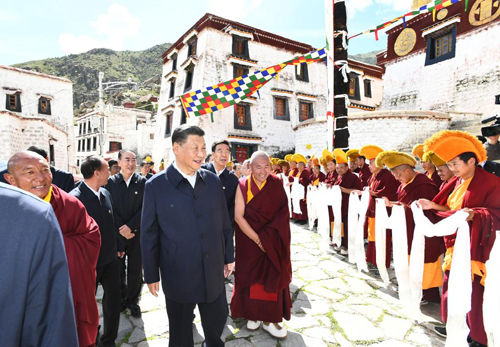 President Xi Jinping, also general secretary of the Communist Party of China (CPC) Central Committee and chairman of the Central Military Commission, inspects the Drepung Monastery located in the western suburbs of Lhasa, Southwest China's Tibet autonomous region, July 22, 2021. [Photo/Xinhua]
In Lhasa, he spoke with monks at the Drepung Monastery, talked to Barkhor Street vendors and held exchanges with tourists and residents at Potala Palace square.
"I feel pleased to have witnessed the beautiful and magnificent splendor of the plateau and its vibrant new look," he said.
Tibet used to be one of China's least-developed regions, with the highest level of difficulty in poverty alleviation.
The president spoke twice at high-level symposiums on Tibet-related work, in 2015 and 2020, setting out policy directions for the region's growth in the new era.
By the end of 2019, all of the region's 74 impoverished counties had been removed from the list of poverty-stricken areas, with over 620,000 people lifted out of penury.
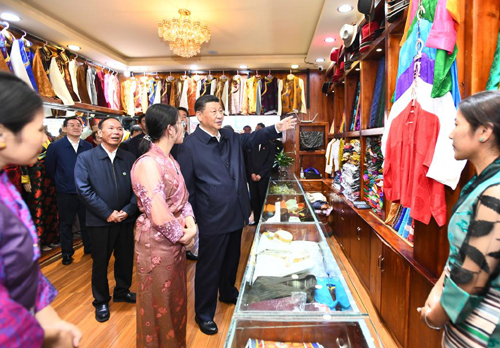 President Xi Jinping, also general secretary of the Communist Party of China (CPC) Central Committee and chairman of the Central Military Commission, visits a shop and learns about the development of tourism and cultural industries, as well as the preservation of Tibetan culture, at Barkhor Street in Lhasa, Southwest China's Tibet autonomous region, July 22, 2021. [Photo/Xinhua]
During the visit, Xi emphasized that people of all ethnic groups had jointly contributed to the development of Tibet.
History has provided many examples of exchanges between Tibetan and other ethnic groups, he said.
The region is at a new starting point of its development, and the Party's leadership must be upheld and the path of socialism with Chinese characteristics must be followed, he said.
In promoting the high-quality development of Tibet, it is important to see growth in various areas from the perspective of ethnic unity and progress and ensure that growth will help improve the sense of gain, happiness and security of people of various ethnic groups, he said.
The president underlined the need to accelerate the construction of railways, roads and other major infrastructure projects, develop industries with local characteristics and quicken the development of a national base for clean energy.
He urged authorities to take concrete steps to address jobs, education, social security, healthcare, eldercare and housing security.
He reiterated the significance of protecting the region's ecology and environment, saying it is important to improve environmental governance, protect the biodiversity of the Qinghai-Tibet Plateau, and stick to a development path that ensures harmony between humans and nature.
Dorje Tashi, a lecturer at Tibet Vocational Technical College, said Xi pointed the way for development of the region during the visit, adding that the tour will be significant to the ethnic unity, social harmony and economic growth of the region.
Zhang, from the China Tibetology Research Center, said ethnic unity is crucial to social harmony and stability, the long-term peace and order of a nation and the happiness of people.
"The general secretary has underscored a basic historical fact that Tibet has been the area where different ethnic groups of the nation have been living and thriving since ancient times. Tibet's case has revealed that the different ethnic groups of China are a community with a shared future that shares weal and woe," he said.
|
- Home
- News Tibet |Exclusive |China |World |Related News |Latest
- Documents White Papers |Others
- Photo Politics |Economy & Society |Culture & Religion |Human & Nature |Beautiful Tibet |Other Tibetan-Inhabited Area |Exchanges |Related
- Video News |Documentary |Micro-Video |Entertainment
- Art
- Tourism
- In Focus
- About Tibet

